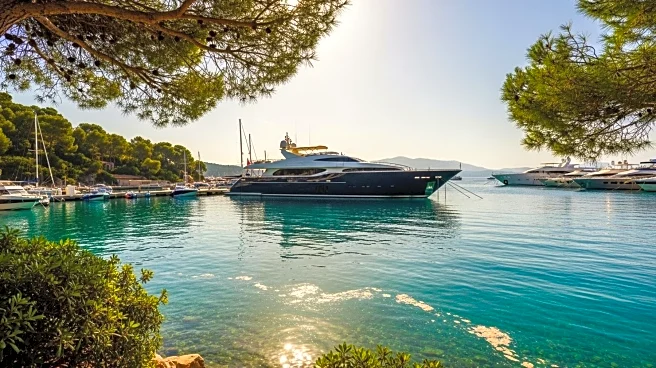What is the story about?
What's Happening?
Mark Zuckerberg, CEO of Meta, has chosen the La Ciotat shipyard in France for repairs on his $300 million yacht, Launchpad. The yacht, known for its significant carbon footprint, has completed a fuel-intensive journey, consuming two million liters of diesel and emitting 5,300 tonnes of CO2. This decision has raised eyebrows due to the ecological impact of the vessel, which is equipped with four MTU 20V 4000 diesel engines. The yacht's recent voyages included trips to Norway, Greece, and Italy, where it emitted substantial amounts of CO2. The choice of La Ciotat, renowned for its technical skills and discretion, highlights the paradox between France's ecological reputation and the welcoming of ultra-polluting vessels.
Why It's Important?
The repair of Zuckerberg's yacht in France underscores the tension between economic interests and environmental concerns. While the La Ciotat shipyard benefits economically from servicing luxury yachts, the environmental impact of such vessels is increasingly scrutinized. This situation highlights the disconnect between the environmental rhetoric of Silicon Valley elites and their personal practices. As Europe faces calls for energy sobriety, the repair of an energy-guzzling yacht raises questions about the privileges of the ultra-rich and their impact on climate change. The debate over the environmental footprint of luxury yachts is likely to intensify, reflecting broader societal concerns about sustainability and inequality.
What's Next?
The repair of Zuckerberg's yacht may prompt further discussions on the environmental responsibilities of wealthy individuals and the industries that cater to them. As public awareness of climate change grows, there may be increased pressure on luxury yacht owners to adopt more sustainable practices. France, known for its ecological initiatives, may face criticism for accommodating such polluting vessels, potentially leading to policy changes or public backlash. The situation could also influence the luxury yacht industry to explore greener technologies and practices to align with global sustainability goals.
Beyond the Headlines
The repair of Zuckerberg's yacht in France highlights ethical considerations regarding the environmental impact of luxury lifestyles. It raises questions about the accountability of wealthy individuals in contributing to climate change and the role of industries in enabling such practices. The situation reflects broader cultural shifts towards sustainability and the growing demand for transparency and responsibility from influential figures. As debates about the privileges of the ultra-rich continue, this event may serve as a catalyst for change in how luxury and environmental stewardship are perceived and managed.















